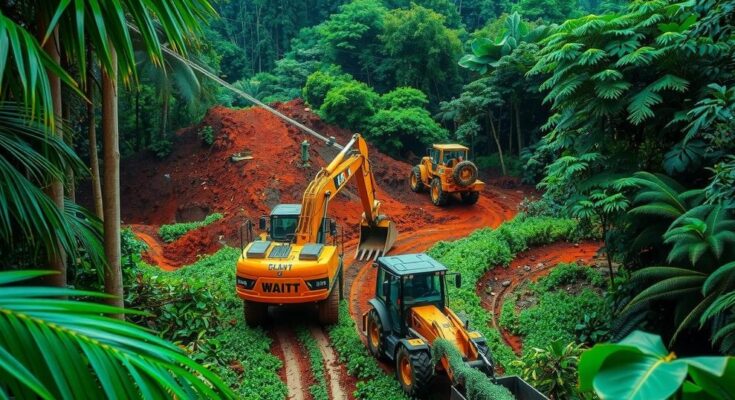The construction of a four-lane highway in the Brazilian Amazon has led to the destruction of eight miles of rainforest, raising environmental concerns ahead of the COP30 Climate Summit in Belem. While officials defend the project as necessary for traffic relief, local residents voice apprehensions about ecological damage and its impact on their livelihoods.
The construction of a four-lane highway in the Brazilian Amazon has generated significant backlash, as approximately eight miles of rainforest have been destroyed to accommodate it. This development coincides with the upcoming COP30 Climate Summit in Belem, where over 50,000 attendees, including global leaders, are expected to participate this November. Drone footage starkly illustrates the severe environmental impact of this initiative, showing dirt tracks marred through the previously untouched landscape.
The highway’s primary objective is to alleviate traffic congestion in Belem, a strategy outlined by local government officials. However, this effort has raised alarm among environmentalists and local residents, who question how such destruction aligns with the summit’s aim of fostering environmental protection. Critics emphasize the importance of the Amazon as a vital ecological resource, highlighting the contradictory nature of the highway’s construction.
Adler Silveira, the Secretary of Infrastructure for the state government, staunchly defended the project as a necessary mobility enhancement. He referred to it as a “sustainable highway” that would leave a legacy beneficial for the region and optimize access during COP30, according to Daily Mail.
Additionally, Brazilian President Luiz Inacio Lula da Silva characterized the event as “a COP in the Amazon, not a COP about the Amazon,” expressing that the summit intends to demonstrate the government’s commitment to Amazon conservation efforts.
Local community members, however, express discontent regarding the highway’s implications. Claudio Verequete, a resident located mere meters from the construction, lamented that “the new road has destroyed everything,” emphasizing the economic impact on families reliant on their previous harvests. He also voiced concerns about the detrimental effects, noting that the highway’s design could impede access to essential urban services for those living nearby, raising questions about the genuine benefit to local populations.
In summary, the construction of a highway through the Amazon rainforest has sparked significant controversy, as it poses serious threats to the region’s biodiversity. While government officials defend the project as necessary for traffic relief and describe it as sustainable, local residents express concerns about the loss of livelihood and accessibility. The conflicting narratives underscore the broader challenges of balancing development with environmental conservation, particularly in the context of a climate summit.
Original Source: m.economictimes.com




